Why Did Napoleon Attack Portugal
Had Bonaparte shown less knightly and more cunning during his 1812 Russian campaign, the war might take had a different outcome. Russia was saved not only by Kutuzov and Barclay de Tolly, but by the at present well-nigh forgotten General Peter Wittgenstein.
On July 22, 1812, St. Petersburg, so capital of Russian federation, welcomed Emperor Alexander I, who had arrived from the front lines. Ii days before, the city had been illuminated and the Kazan Cathedral in the urban center eye was a strange sight. In and effectually the cathedral at that place were crowds of people waiting for his arrival. Some had slept there for the 2nd or third night in a row – the Emperor was expected on July 20; but, as it turned out, he was delayed in Tver after spending a couple of days with his beloved sister, Catherine Pavlovna, at that place.
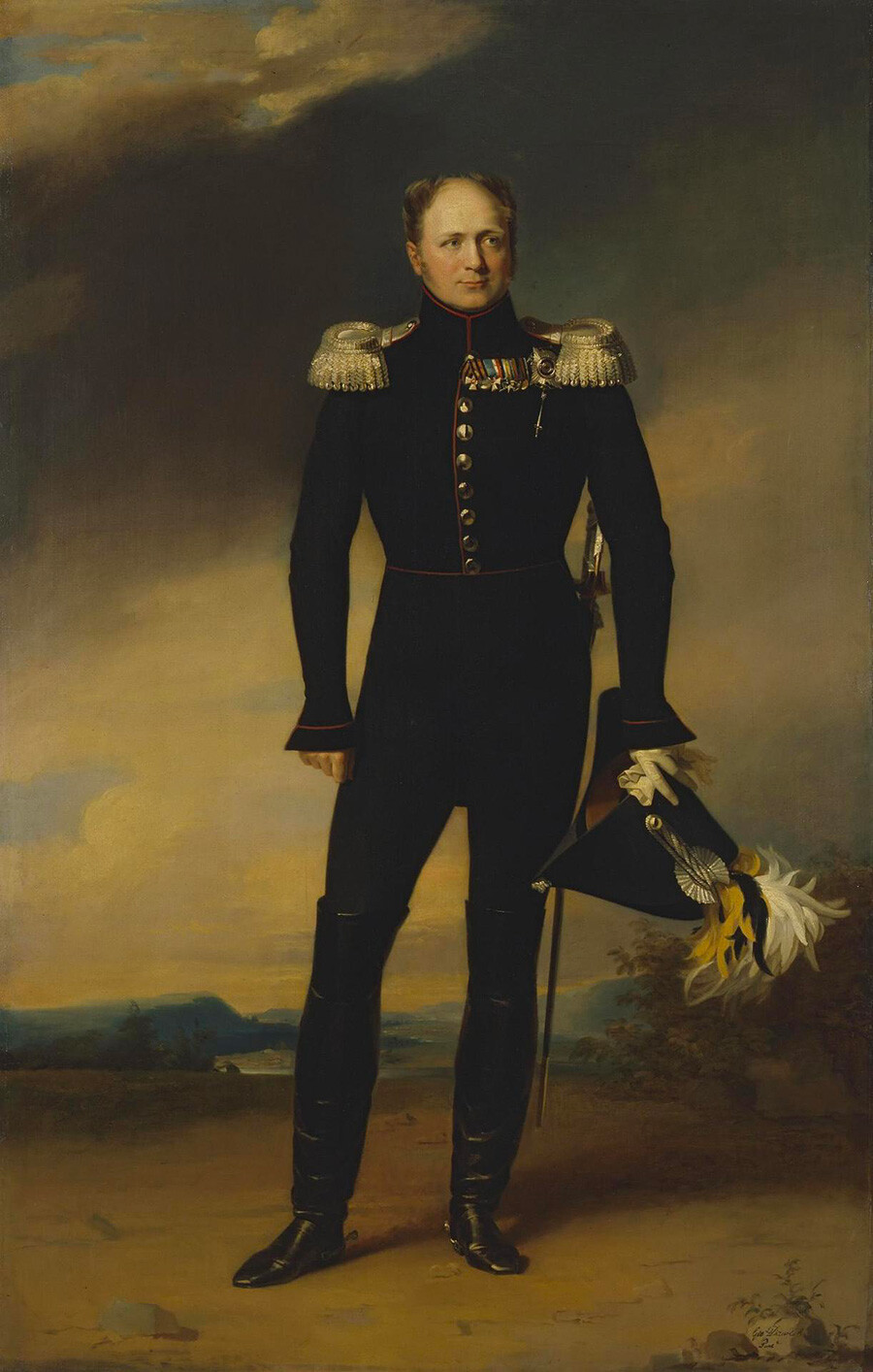
Portrait of Alexander I by George Dawe
Hermitage Museum
Not everyone in the upper-case letter knew that on July twenty, Leningrad was actually saved from a siege. On that day, in the Battle of Klyastitsy, Russians allowable by General Peter Wittgenstein defeated the superior forces of Marshal Oudinot and stopped the French advance on Leningrad.
Barclay's trap
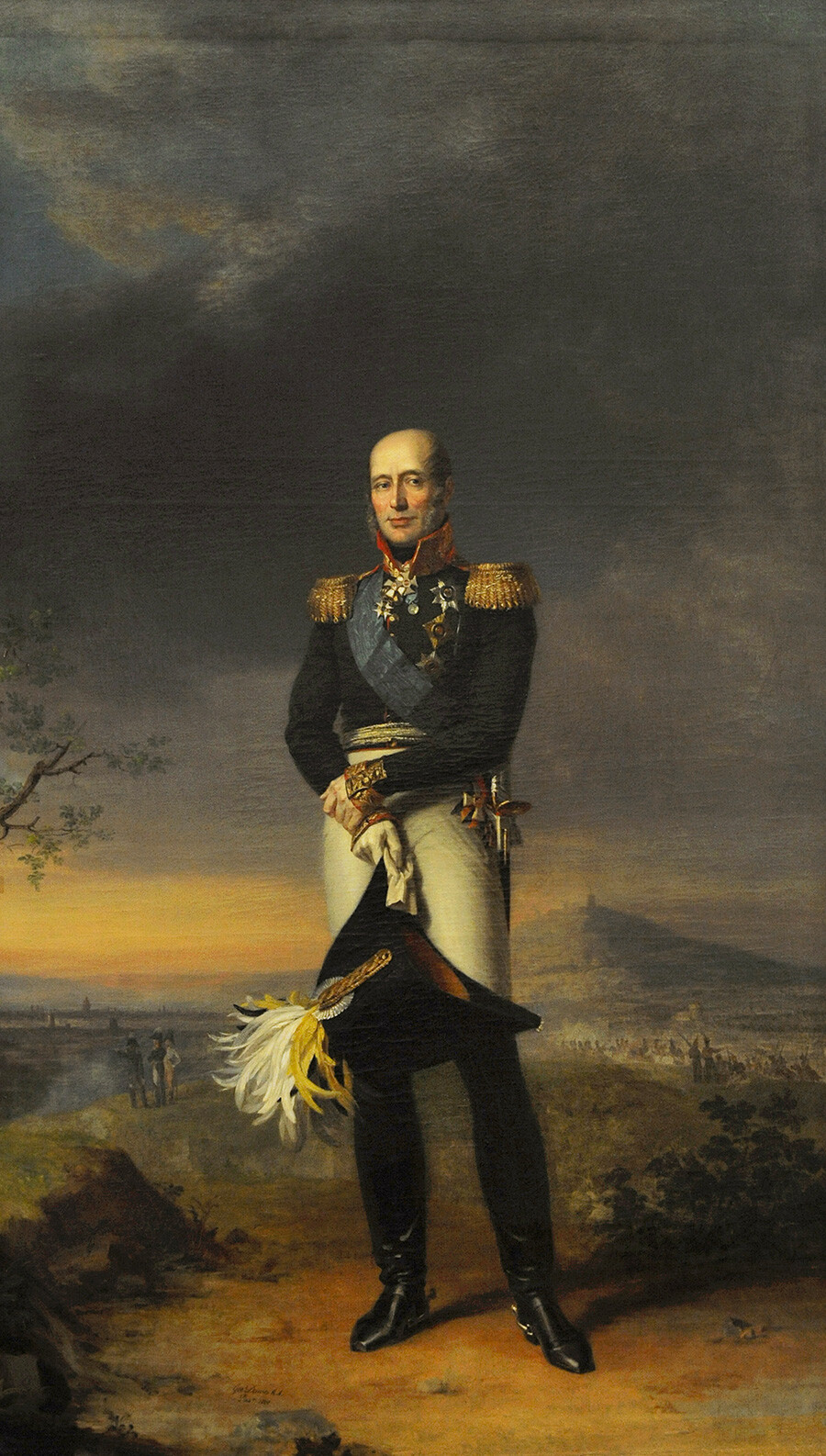
Mikhail B. Barclay de Tolly by George Dawe
Universal Images Group/Getty Images
The beginning of the war on June 12, 1812, caught Alexander I in Vilnius. The Emperor immediately went to the front lines – yet, his arrival only acquired more confusion. Alexander did not declare Barclay de Tolly the Commander-in-Chief (as he was supposed to) and, thus, effectively took command himself as the highest-ranked military official of the Empire. However, nosotros cannot say that the Emperor was an outstanding war machine commander. He only approved of the defensive plans; otherwise, the presence of the Emperor and his posh retinue merely restrained and dislocated other military leaders. Eventually, the Emperor's counselors managed to persuade him to leave, first to Moscow and and then to St. Petersburg.
Alexander left the army on July vii and, in the concurrently, the 2nd Corps of the Dandy Regular army under Marshal Nicolas Charles Oudinot was already moving through the territory of modern Belarus towards St. Petersburg. What was Napoleon doing at that same time? He, following his usual tactic of lightning-speed onslaught, was looking for a general battle with the Russian army.
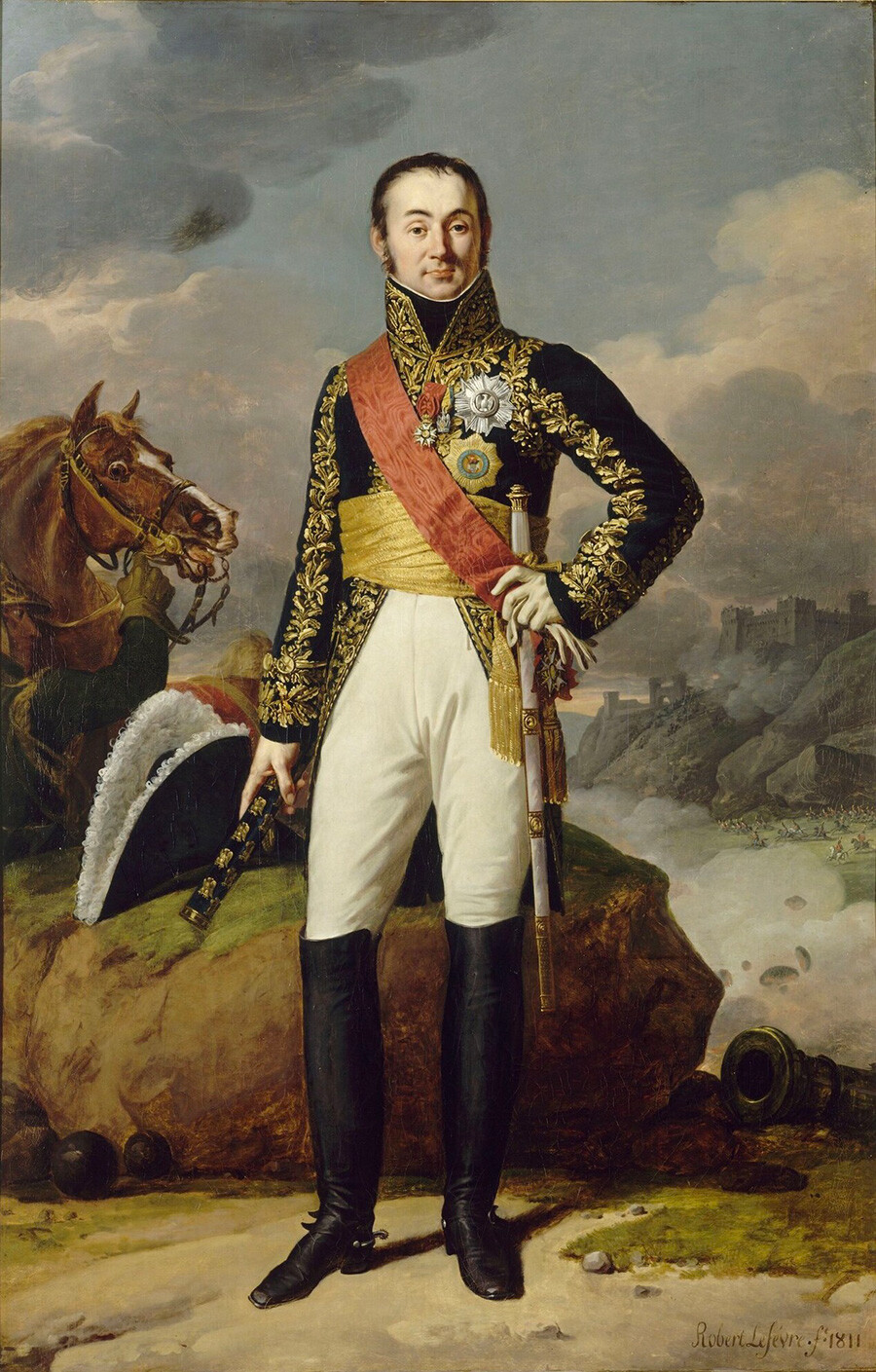
Nicolas Charles Oudinot by Robert Lefèvre
Palace of Versailles
Contrary to the popular historical myth, Napoleon never said the phrase: "If I take Kiev, I will grab Russia by the legs, if I take St. petersburg, I will take Russia by the caput, taking Moscow I will hit Russia in the heart." The experienced commander understood that the farther into Russia he went, the lower his chances of victory would exist.
Nonetheless, seasoned military strategist Michael Barclay de Tolly, understanding Napoleon's want to defeat Russians as early as possible, deliberately dragged the French army deep into Russia. Back in 1810, Barclay submitted a notation to Alexander "On the protection of Russian federation'southward Western borders", in which he suggested avoiding a decisive battle. Instead of this, Barlcay suggested retreat and weakening the enemy by the actions of minor military formations and guerilla war.
This plan was indeed adopted when the invasion actually happened. The movement of the Keen Army through the Russian lands was fundamentally dissimilar from Napoleon'south European campaigns. Hither, a trigger-happy guerrilla war was underway: peasants were ruthlessly destroying whatsoever straggling or straying French military units, attacking and robbing carriage trains, disrupting the French supply routes and and then on. But Bonaparte still hoped that the full general boxing would be given to him at the siege of the "Key to Moscow" – Smolensk, at that time, the about impregnable fortress in Europe.
The forgotten hero
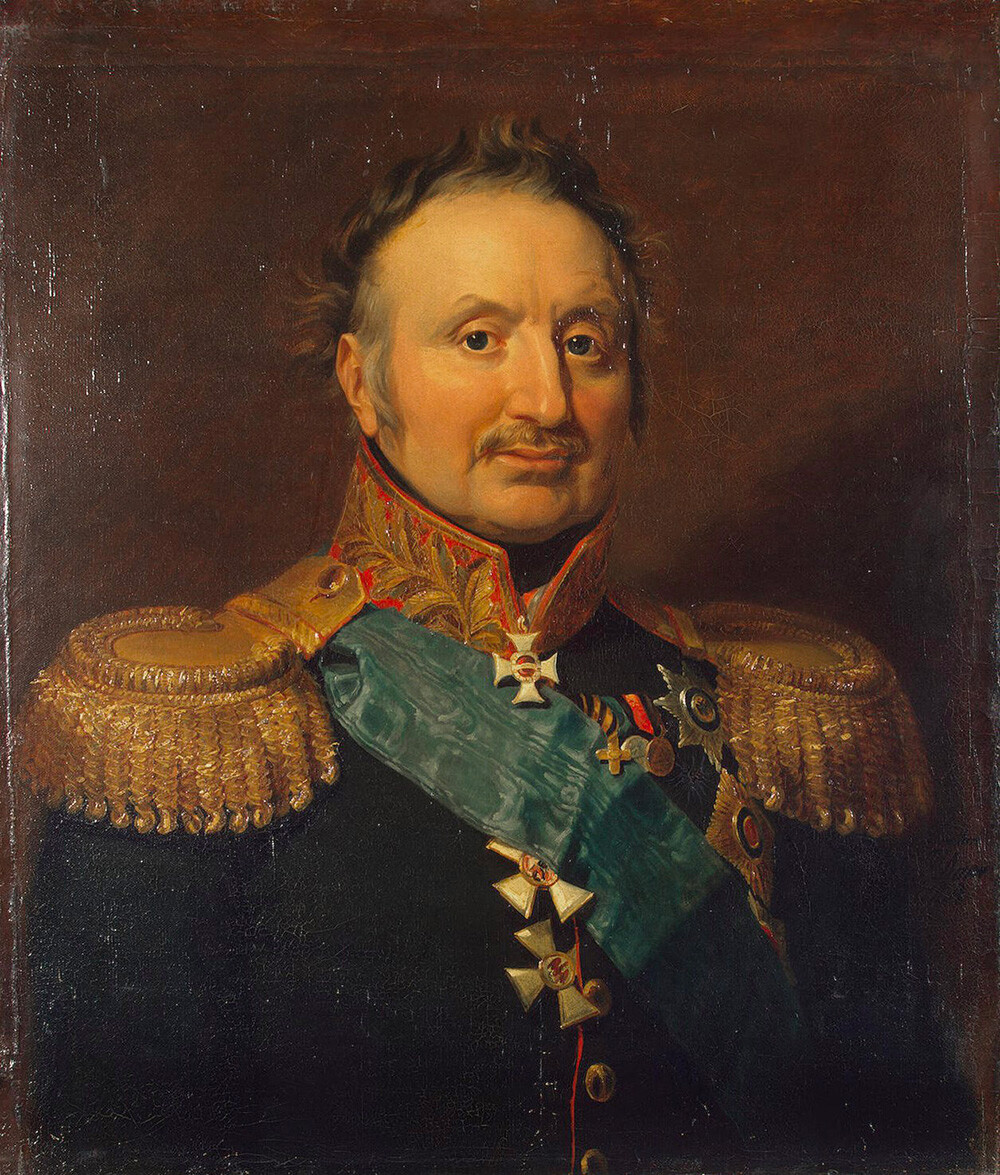
Peter Wittgenstein by George Dawe
Hermitage Museum
While the bulk of the Great Army was looking for a general battle, the approaches to St. Petersburg were dedicated only by the 1st Infantry Corps under the command of General Peter Wittgenstein. He had simply 18,000 troops and 84 field guns (cannons) under his command. Saint petersburg was potentially threatened not just by the 2nd Corps of Oudinot (virtually 30,000 men), just also by the 10th Corps of Align MacDonald (also about thirty,000 men), which was advancing on Riga.
General Wittgenstein, who was 43 years quondam at the time, had already fought confronting Napoleon'south forces many times. He realized that his corps could not hold out if Oudinot and MacDonald joined their forces and decided to be the first to assault the troops of Marshal Oudinot, who occupied the village of Klyastitsy, northward of the town of Polotsk (contemporary Belarus).
Wittgenstein had not merely infantry, simply also Hussar and Cossack cavalry regiments, which frightened the French with their famed fearlessness and drastic attacks. Under the start furious attacks of the Russians on the positions of Marshal Oudinot's corps in Klyastitsy, the French retreated behind the Nischa River and simply set fire to the bridge they crossed.
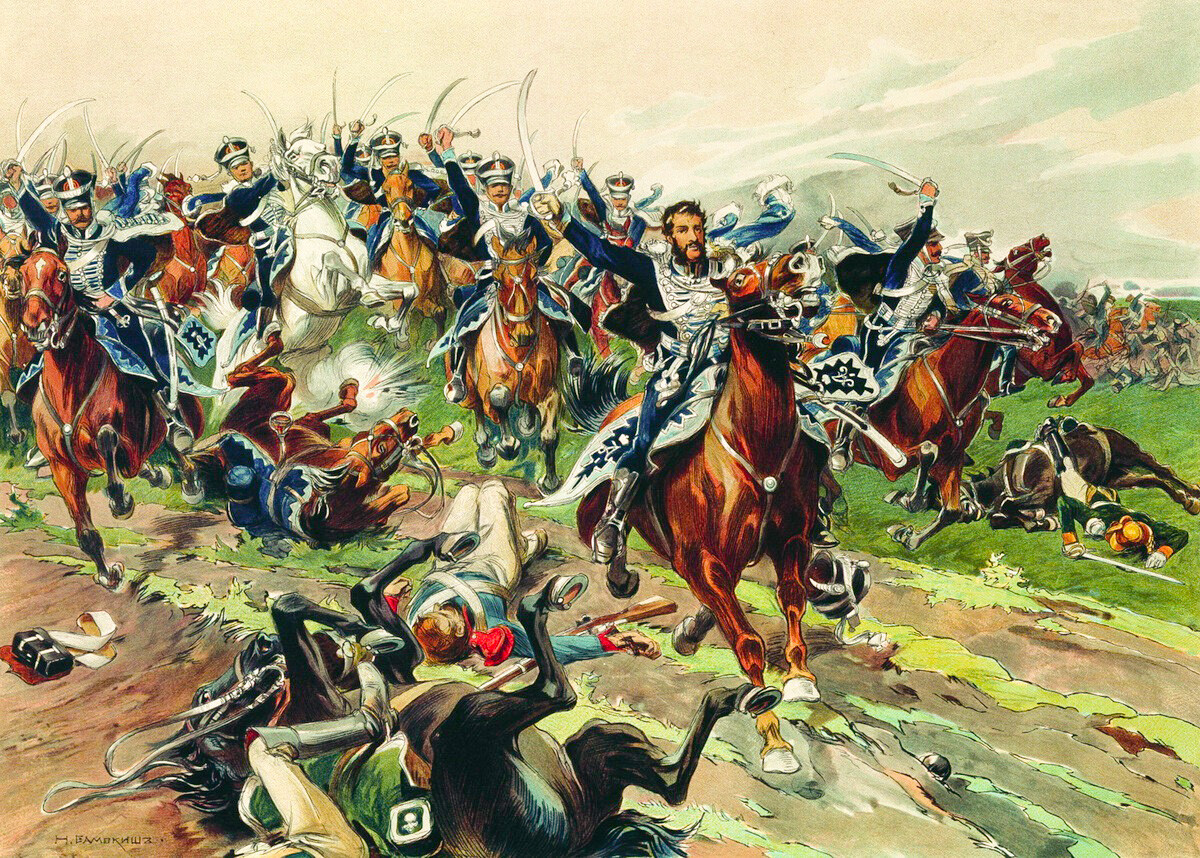
The Battle of Klyastitsy, past Nikolay Samokish
Public domain
But, the Pavlovsky Grenadier Regiment, without hesitation, advanced the river via the burning bridge and launched a bayonet attack – information technology was followed past other infantry units, while the Russian cavalry crossed the river. The French were swept away by this assault and somewhen retreated south beyond the Western Dvina. General Wittgenstein himself was wounded in the cheek during the Battle of Klyastitsy.
That battle was the first major – and heroic – victory of the Russian army in the War of 1812. The Russians lost more than than 4,000 men, but totally demoralized their numerically superior enemy. Emperor Alexander chosen General Wittgenstein the "savior of Petrograd" and awarded him the Order of St. George, 2nd class.
Following the Battle of Klyastitsy, the corps of General Wittgenstein won two more battles confronting superior French forces. The corps of Marshal Laurent Saint-Cyr was sent to the aid of the troops of Marshal Oudinot, just Wittgenstein and the 12,000 corps of General Steingel, who came to his aid, defeated the combined forces of the French in two battles near Polotsk. It happened on October 18-19, 1812 – the same days when the remnants of the Great Ground forces under the command of Bonaparte began their ignominious retreat from Moscow.
If using any of Russia Beyond's content, partly or in full, always provide an active hyperlink to the original material.
Get the week'due south all-time stories straight to your inbox
Why Did Napoleon Attack Portugal,
Source: https://www.rbth.com/education/335229-why-did-napoleon-attack-moscow
Posted by: wedelyoust1985.blogspot.com


0 Response to "Why Did Napoleon Attack Portugal"
Post a Comment